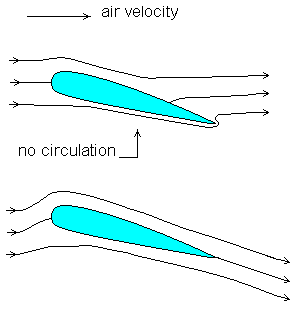How does a plane fly? (I think i have a good idea, but it would be nice to hear it in precise terms)

How does a helicopter fly?
This is the million-dollar question. As an interesting point of fact, most aerospace engineers - graduated and everything - will have a hard time answering this question for you because
even Wikipedia gets it wrong.
That link actually goes to the Equal-Transit Time theory, which is the popular explanation for how airplanes generate lift. It is completely false for more than one reason, not least of which includes that there is no physical reason for the two particles to be linked, and that, in fact, experimentally it is often seen to not be the case.
The other reason that theory is false is the same reason why Wikipedia is wrong and why most aero's struggle to answer the question: Bernoulli's theorem is plain unapplicable here, mainly because you can only compare pressures across one streamline. When you get into radically different streamlines, above and below the wing? And what about high-speed airflows that don't even obey the conditions under which Bernoulli's theory works? Then you're in for a world of hurt.
But not all hope is lost, because we actually have a pretty good explanation for lift that doesn't rely on Bernoulli's equations of velocity and density and what-have-you. The basic explanation is that air enters the trailing edge moving horizontally, and exits the trailing edge smoothly, and at an angle, like so:
True (look at the second diagram here, the one "with circulation")

-----------------------------------------------------------------------------
False:

The air exiting off of the trailing edge pushes back on the airfoil, adding momentum in the vertical direction. Conservation of momentum* teaches us that, in order for the momentum of this vertically-traveling airflow to be equalized, a force must be generated. That force is commonly understood as the lifting force, and is equal and opposite to the downwash of the flow.
Now then, why does the air come off the trailing edge smoothly? That introduces a whole new concept called circulation, which can be basically understood as the tendency of the airflow to change its direction around the wing. Think of the wing as a hardened vortex that gradually swirls the air around it.
Helicopters basically have wings as well - the helicopter blades are each symmetrical wings, good for going up and down depending on what you need. They lift for all of the same reasons that an airplane lifts, although that is the end of the similarities between them. Because of the orientation of the blades, the calculations involved in the airflows above and below a helicopter are very complicated. Basically, if you can describe why an airplane flies, you can describe why a helicopter flies.
* I know that the Bernoulli equations are a derivation of Newton's equations, but they are nonetheless simplified in extremum. They add a lot of other terms because air, unlike water, is a
complicated fluid. When you start dealing with "real" air and 3-dimensional wings, along with the vortices that get formed off of the trailing edge and at the wing-tips, the Bernoulli explanation doesn't even start to work
mathematically anymore. Hence why we describe the lift as happening because of the dramatic circulation of the airflow.
When will we have a Single-Stage-to-Orbit spaceplane that uses airbreathing dual-mode engines?

Hah, I have no idea! I do know that a big area of research right now is VTOL planes that transform into jets after they're done being helicopters.
Spaceplanes aren't receiving a lot of focus since the space shuttle program got slashed, as most of the concentration is going into big rockets for traveling to other celestial bodies and whatnot. Which is fine by me, but it means cool toys, like spaceplanes, are put on the backburner.
How far are you in your major?
Have you done any actual research?
Is there any good free CFD modelling software that you know of? I got forced into learning about aerodynamics for a flowmeter I was working on awhile back, it would have been helpful if I knew of some good free simulation software.
I am three years into a six-year program.
I am currently in the process of doing some research for NASA regarding information dissemination; or, in other words, nothing very cool.
I have done some research on fuzzy logic systems and modeling and hope to do some research on more advanced methods of computational fluid dynamics, the true subtleties of which are only known to me due to excessively talking with my professors about it.
On the question of free CFD software, that is an
excellent question. All snark aside, if you're interested in more "popular" applications, something like
this is bound to impress a girl or two. If you want something more powerful, however, the sad fact is you're either going to need to shell out or model the airflows yourself, with a program like
Tecplot. That answer isn't really helpful to somebody outside the field, but I don't have any personal knowledge of really good, free CFD software.
asbestos said:
what do you say instead of "its not rocket science"?
for example, "I don't get rocket science, but at least it's not < x >".
"At least it's not like talking to girls!"







 , should I build a Laboratory before building the SS Thrusters?
, should I build a Laboratory before building the SS Thrusters?
